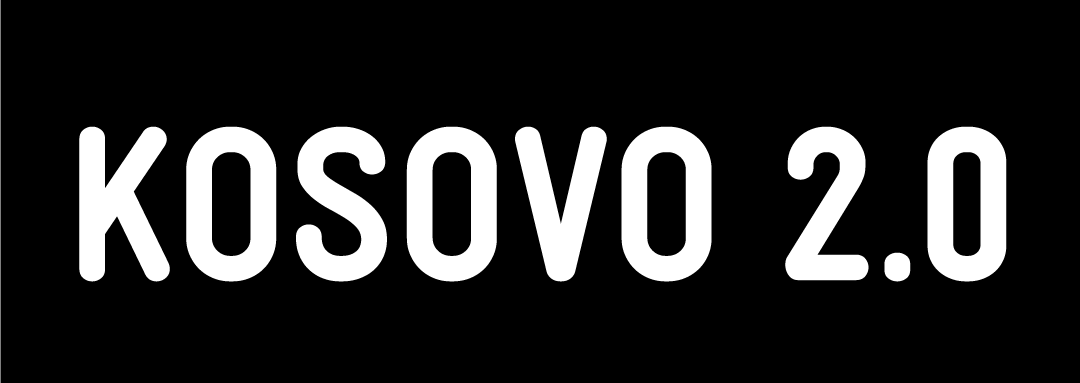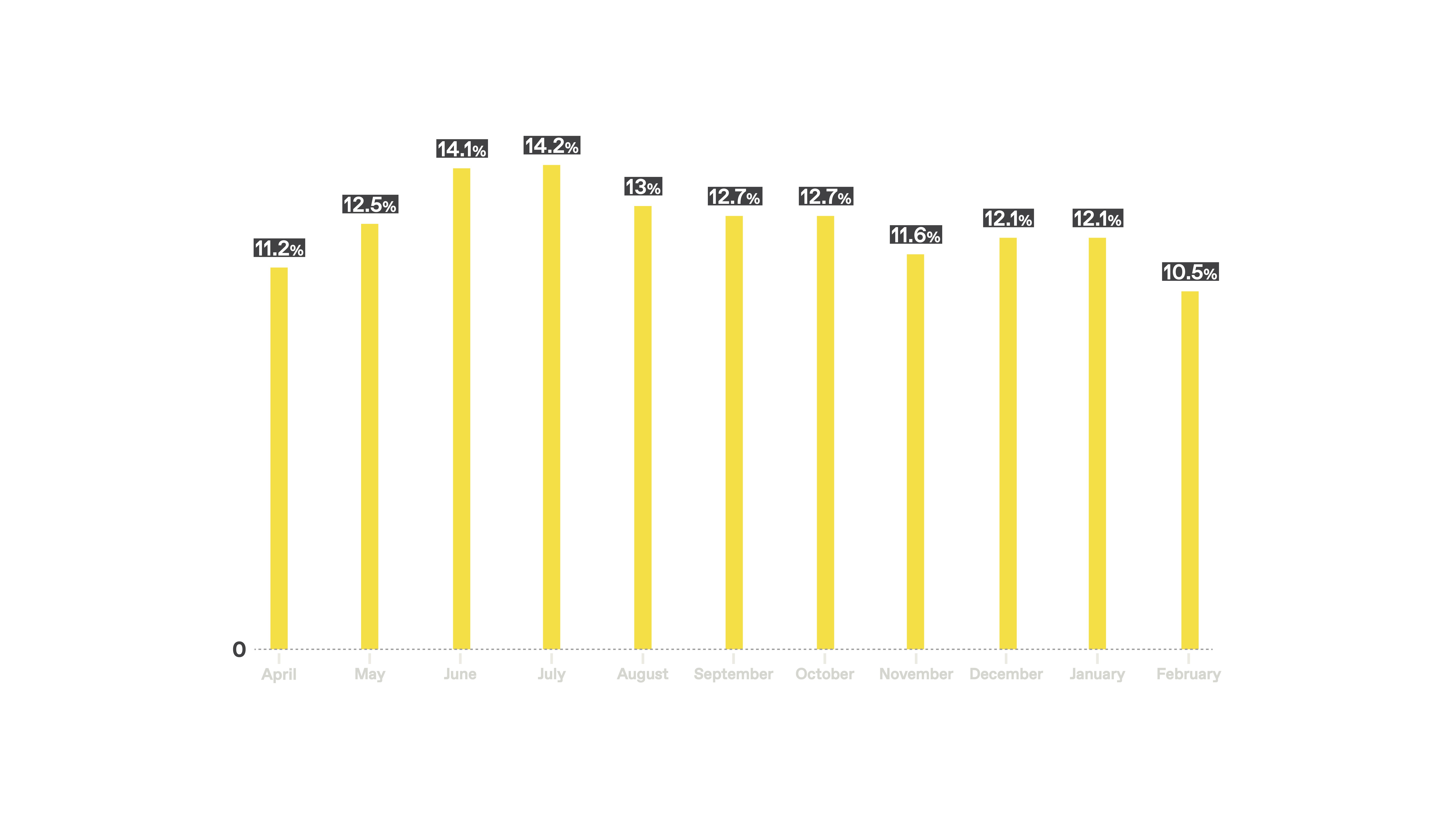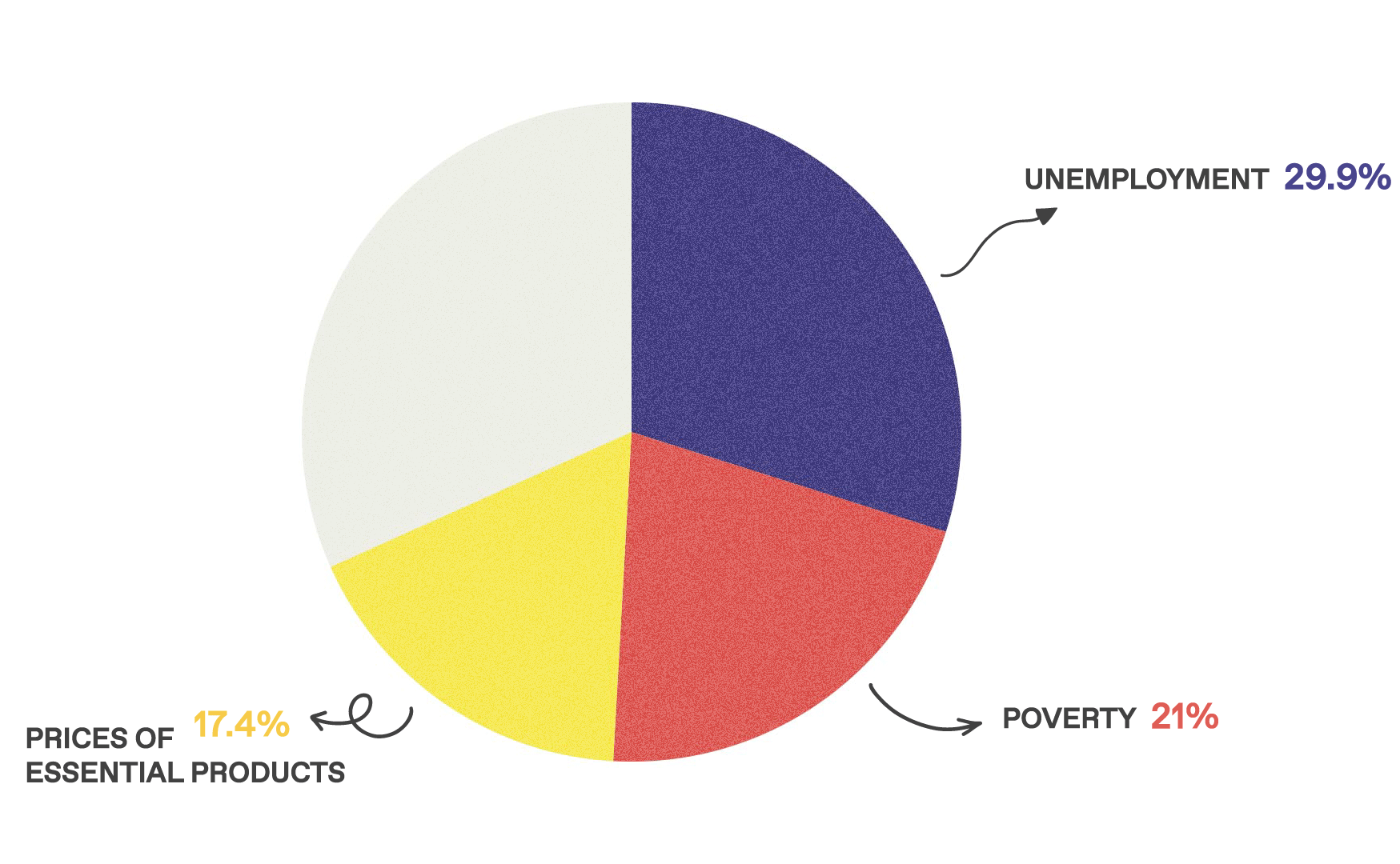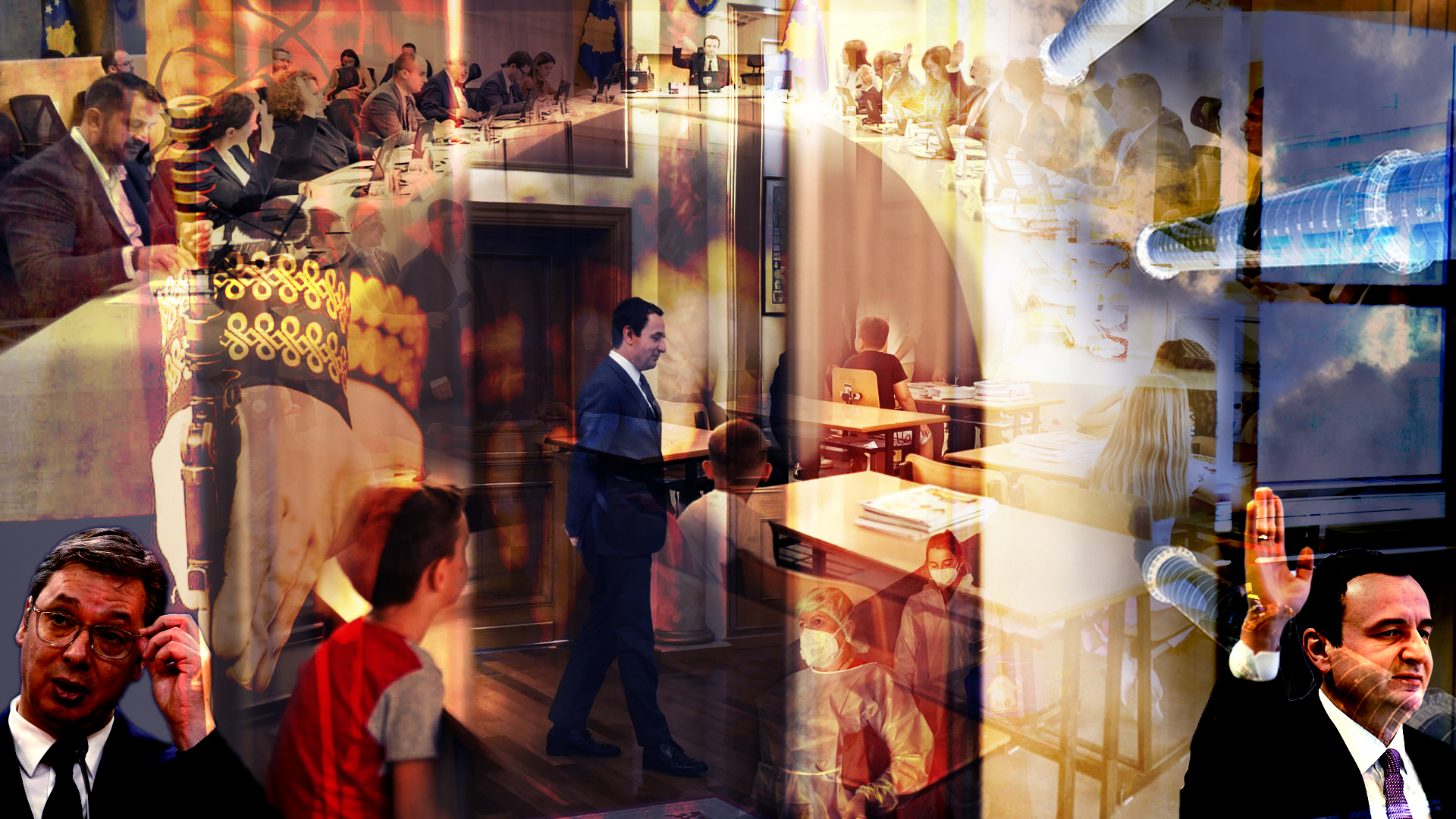
Two years of Kurti’s government: How is it going?
The second year of the Kurti’s government examined.
22/03/2023
It’s now been two years since Vetëvendosje (VV), in coalition with Lista Guxo, formed a government after winning just over 50% of the vote in the elections of February 14, 2021.
With equality and justice at the center of the governing program, the newly elected Prime Minister Albin Kurti promised to undo “20 years of misgovernance” and that start “the new path toward progress, reducing inequalities and increasing opportunities for all.”
The electoral victory — the largest since the declaration of Kosovo’s independence — and the pledges for radical change created big expectations among voters. With a parliamentary majority and a “referendum” victory, as Kurti called it, VV, once a vocal opposition party, had the opportunity to “meet the will of the citizens” in government.
However, the popularity of the government and the prime minister seems to have declined in the last two years. According to the UNDP Public Pulse poll, conducted in November 2022, the level of satisfaction with the government’s executive branch was 41%, compared to 47.2% in April 2022.
The level of satisfaction with the prime minister’s work in November 2022 was 44.9%, a decline from 52.6% in April.
On the two year anniversary of the Kurti government, K2.0 examines the government’s second year in power and the progress of their program between March 2022 and March 2023, covering everything from the Kosovo-Serbia dialogue, the economy, the judiciary and more.
Economic stagnation
During 2022, Prime Minister Kurti often mentioned the economic growth of 10.7% in 2021 and the of 4% in 2022 as successes. However, according to data from the World Bank, the International Monetary Fund and the Central Bank of Kosovo, economic growth has stagnated in 2022.
According to data from the World Bank, economic growth during the first half of 2022 was 3.2% with a forecast that during the second half of 2022 growth would be no higher than 3.1%.
This is the slowest economic growth since 2012, according to World Bank data, if we do not take into account the rapid economic growth of 2021 that was a result of reopening after the worst of the pandemic.
In October 2022, Prime Minister Kurti said that 15,000 new jobs were created in the months between January and August 2022, a number that has been disputed. According to the Private Sector Union and some economists, this number is a result of informal workers being brought into the formal economy.
This process of bringing more workers and employers into the formal, tax-paying economy — an objective of the government — was partially the result of financial support through the Economic Recovery Package. Parts of this package that provided assistance to private sector businesses and workers were only accessible to workers in the formal economy.
The Kosovo Agency of Statistics (ASK) has not updated the data on unemployment in Kosovo since 2021.
Although according to Kurti, Kosovo is experiencing its greatest economic growth ever, inflation in Kosovo, an import of broader international inflation, has stayed at double-digit levels over the past 12 months.
Another important economic aspect is reciprocity with Serbia. Despite VV’s constant rhetoric about reciprocity measures, repeated calls for a boycott of Serbian products and promises that the market will be reoriented, foreign trade data from ASK shows that the market has not reoriented. Since the Kurti government took power in 2021, Serbia appears to be the main country Kosovo imports from out of the CEFTA countries, well above imports from Albania and North Macedonia. According to an analysis by the GAP Institute, Serbia is Kosovo’s fourth largest trading partner in 2022 after Turkey, Germany and China.
Imports from Serbia increased
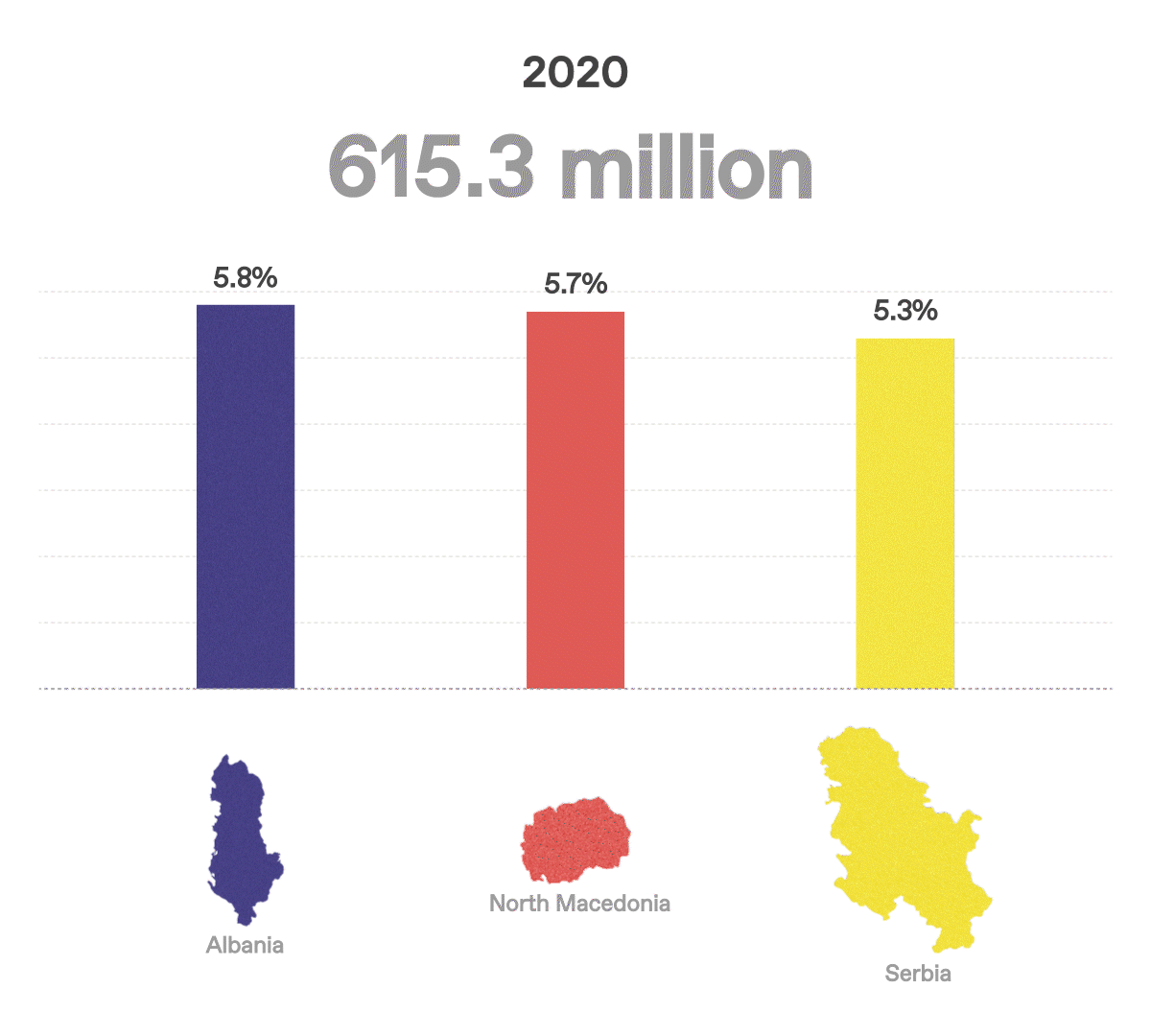
Kosovo's main trade partners
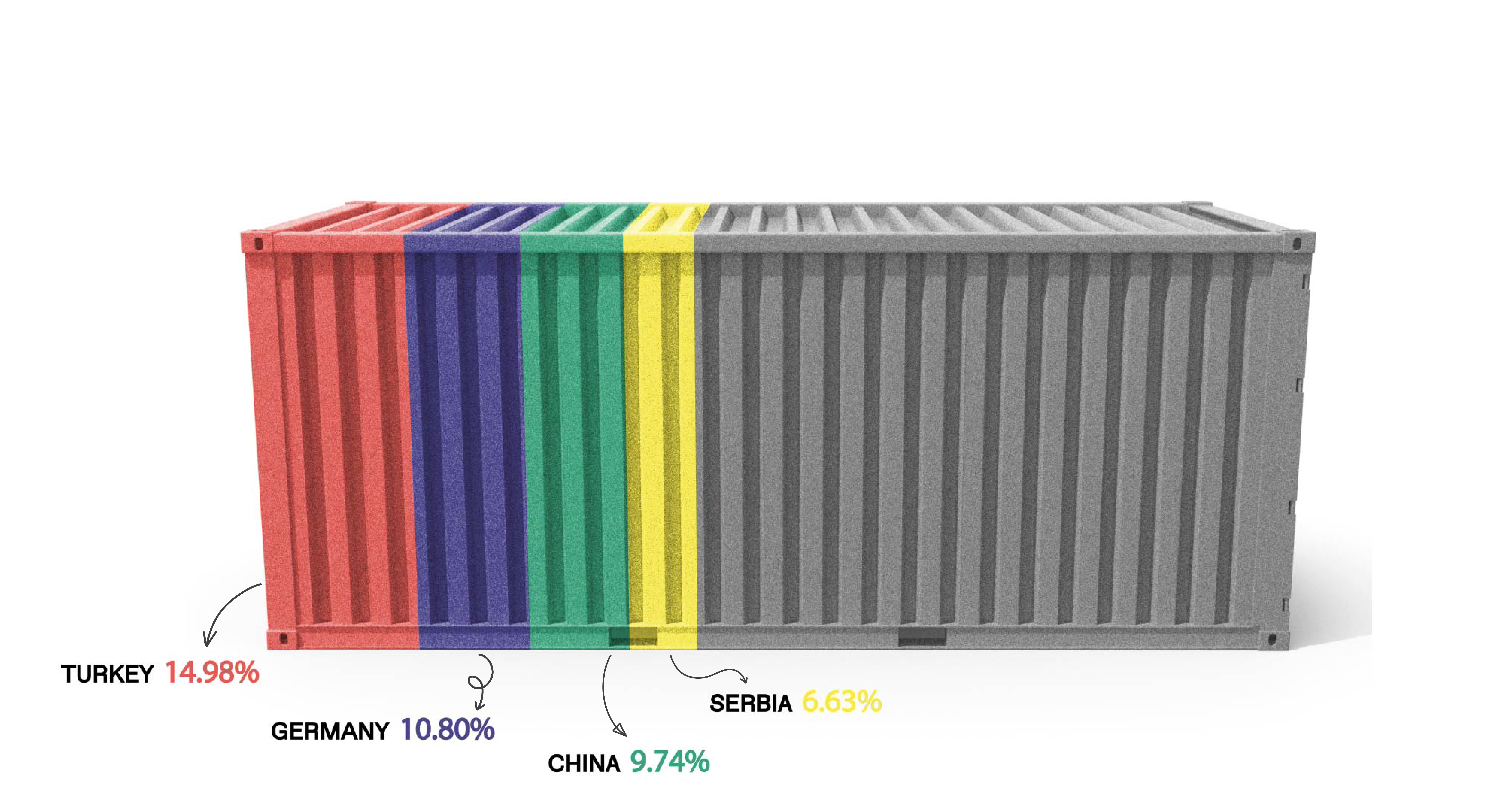
Although foreign trade data for 2022 has not yet been fully released, the monthly review of imports from CEFTA countries shows that Serbia has been at the top of the list every month.
Meanwhile, capital investments have stagnated. According to an analysis by the GAP Institute, the increase in the prices of construction materials due to inflation and government policies have caused capital investments in the first six months of 2022 to be the lowest in the last decade, with 9% at the central level and 19% at the local level.
The dialogue has become the priority
Kurti initially said that the dialogue with Serbia would not be one of the first five priorities of his governing program and that he would focus on internal dialogue with Kosovo’s Serbs. However, successive crises with Serbia, international pressure for the establishment of the Association of Serb Municipalities and the recent agreement in Ohrid seem to have made it inevitable that he would have to prioritize the dialogue.
In June 2022, the government of Kosovo made two decisions, one on the implementation of reciprocity measures with Serbia regarding license plates and another one on IDs. According to the latter decision, anyone entering Kosovo with identification documents issued by Serbia would be issued a temporary declaration form, which would replace Serbian documents — a procedure that had been in place for Kosovo citizens entering Serbia since 2011.
According to the other decision, residents who have vehicles with Serbian-issued license plates bearing the abbreviations of the cities of Kosovo would have to register their vehicles with Kosovar license plates between September 1 and October 31. After October 31, driving with old license plates would not be allowed.
On July 31, shortly before the decisions came into force, Serbs erected barricades at Jarinje and Brnjak, two border points with Serbia.
The situation settled down after pressure from the EU and the U.S. on the Kosovo government to postpone the implementation of the license plates decision. On July 31, the government decided to postpone it for one month. Meanwhile, on August 27, an agreement was reached to repeal the issuing of temporary identification documents for citizens of both countries.
The U.S. and the EU asked Kosovo’s government to postpone the decision on license plates for 10 months, but the government initially did not accept this request. On October 28, the government presented a three-phase plan for the implementation of this decision.
The situation became tense again after the suspension of the regional director of the Kosovo Police in the north, Nenad Đurić, who had refused to implement the Kosovo Government’s decision on license plates. As a result, in early November, Srpska Lista led a mass resignation of Kosovo Serbs from public institutions.
On November 21, 2022, after an eight-hour meeting in Brussels between Kurti and Vučić, Kurti refused to accept the EU’s proposal to resolve the issue of license plates, arguing that the proposal was not accompanied by a commitment to the full normalization of relations between Kosovo and Serbia. He accused the EU Special Representative Josep Borell of giving up on the normalization of relations between Kosovo and Serbia.
The U.S. requested the implementation of the license plate decision be postponed for 48 hours and Prime Minister Kurti agreed.
However, only two days later, on November 23, Kosovo and Serbia agreed to the November 21st proposal. According to this agreement, Kosovo will put an end to further actions related to re-registration of cars and Serbia will no longer issue plates with the names of Kosovo cities.
Soon after, President Vjosa Osmani announced December 18 as the date for elections in Kosovo’s four northern municipalities. On December 6, an office of the Central Election Commission (CEC) was attacked. Kosovar authorities arrested Dejan Pantić, a former member of the Kosovo Police and stated that there was evidence that he organized the attack on the CEC offices.
Barricades went up again after the arrest. Several roads in the north of Kosovo were blockaded and several border crossings were closed. The barricades came down in late December and early January and Pantić was moved from detention to house arrest. Kosovo’s leadership, according to the EU and the U.S., pledged that there will be no arrests or prosecutions against Serbs related to the barricades.
After the removal of barricades, international pressure to reach an agreement and establish the Association of Serb Municipalities increased. The proposal was known as the Franco-German Plan, now the European Plan.
On March 18, 2023, Kosovar Prime Minister Albin Kurti and Serbian President Aleksandar Vučić met in Ohrid, North Macedonia. It was announced that at this meeting, which lasted more than seven hours, the parties reached an agreement on the implementation of the European Plan for the Kosovo-Serbia dialogue.
The most discussed issue has been Article 7 of the European Plan, which requires Kosovo to immediately start negotiations within the EU-mediated dialogue “to ensure an appropriate level of self-management for the Serbian community in Kosovo” and in accordance with previous agreements.
In a statement to the press after the Ohrid meeting, Prime Minister Kurti said that through the implementation plan, Kosovo had gained “de-facto recognition” from Serbia. In terms of the Association, Kurti commented that Article 7 is about “self-management” and not “self-government.” Nevertheless, they’ve committed to establishing this “self-management” in accordance with previous agreements, implying an agreement to the establishment of the Association of Serb Municipalities in one form or another.
This article was the center of attention because VV has long opposed the formation of the Association. They’ve organized sometimes violent protests and released tear gas in the Assembly building to try to prevent it from moving forward legislatively. Significant VV protests occurred in 2013 around the signing of the Brussels Agreement, in 2015 prior to ratification of an implementation plan for the Association, and again in 2016, 2017 and 2018.
At that time, VV argued that the Brussels Agreement was contrary to the Constitution of Kosovo and would create a new mono-ethnic institution, “placed above the municipalities and between the central government and the local one with a representative role and as a decision-making and organizational body only for municipalities with a Serbian majority.” According to VV, by signing the agreement the government at that time had facilitated the “division of Kosovo,” the “Bosnia-fication of Kosovo” and the creation of a “Republika Srpska.”
In 2021, the first year of his government, Kurti said that they would be committed to reviewing the agreements reached earlier, both in terms of their implementation and also the impact they could have on citizens.
However, Article 10 of the European Plan, clearly states that both parties confirm their obligations to implement all dialogue agreements from the past — which Kurti himself said is an “acceptable and unchangeable” plan. The same is confirmed in the Implementation Plan that was accepted on Saturday, March 18.
The pesky media
Similar to the first year of Kurti’s government, there was a lack of transparency with journalists in the second year.
A request from VV Assembly Member Fitore Pacolli in July 2022 for governmental regulation of the media, especially online, alarmed the Association of Journalists of Kosovo (AJK) and the Press Council of Kosovo (KMShK). In September, AJK continued to call on the government and VV to distance themselves from the “intensified campaign” against the media of some individuals close to the ruling party.
International reports on media freedom in Kosovo suggest there is a less than ideal environment for journalists.
In April 2022, a report on Kosovo from the U.S. Department of State identified the difficulties of journalists in obtaining information from the public institutions in 2021. The report states that “government officials, political parties, government-linked businesses, religious groups and disgruntled individuals pressured media owners, editors and journalists not to publish certain stories or material.”
The State Department report for 2022 said that government officials as well as suspected criminals verbally threatened journalists for reporting that was perceived as negative. According to some editors, government agencies and corporations pulled ads from newspapers that published material criticizing them.
Likewise, the European Commission Progress Report for Kosovo cited AJK in noting an increase in derogatory statements made by politicians towards the media which they fear endangers the safety of journalists and is an attempt to reduce trust in journalistic reporting.
Another report expressed similar fears. After a two-day fact-finding mission in Prishtina in November 2022, the partners of the Council of Europe Platform for the Safety of Journalists published their findings on media freedom and the safety of journalists in Kosovo.
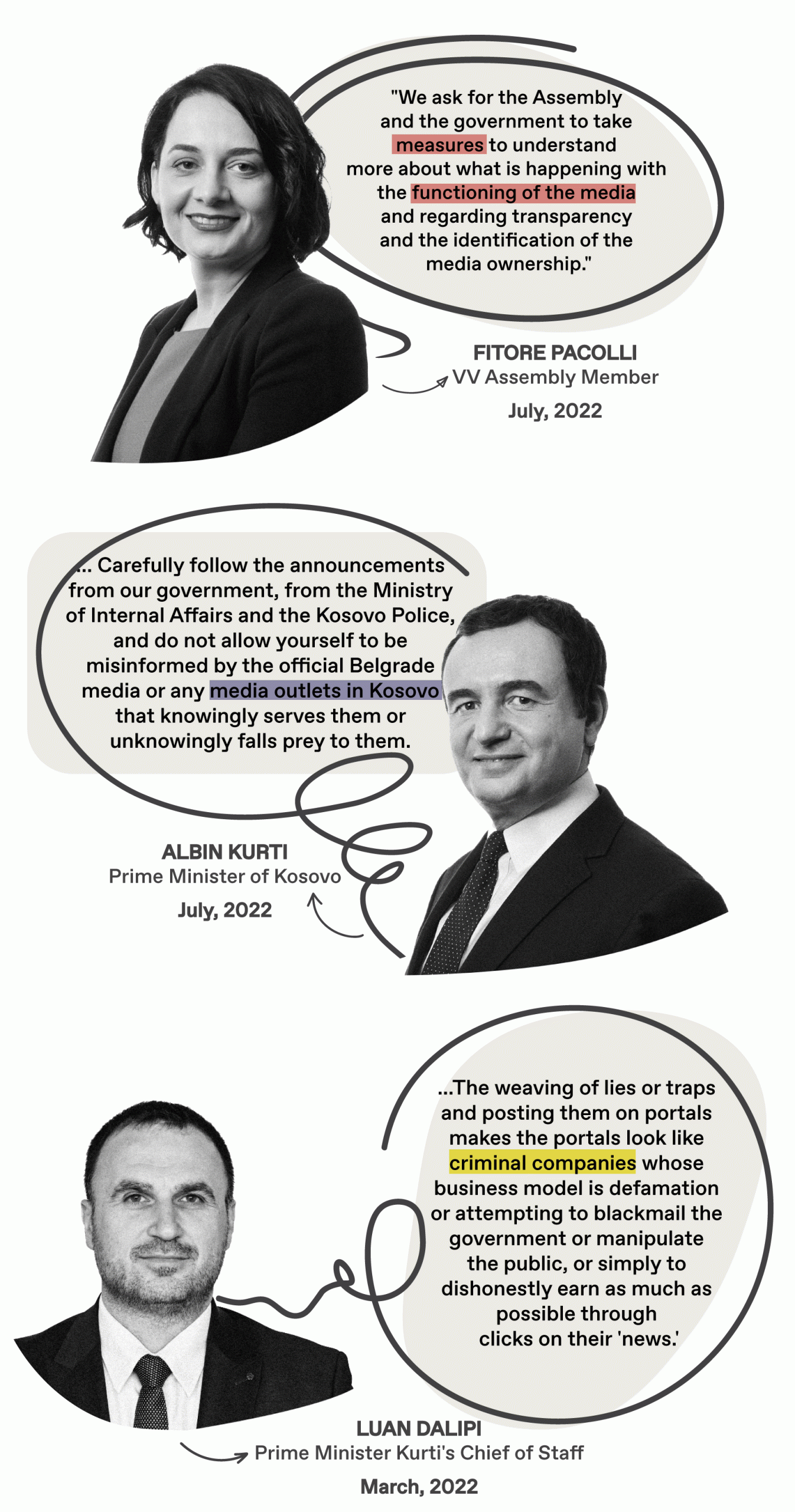
Media representatives in Kosovo have highlighted as a particular concern the fact that divisive rhetoric and defamation campaigns against journalists by some politicians and public officials, including from the ruling party, is creating an increasingly hostile climate against the media. They said that these verbal attacks and attempts by political figures to divide the journalistic community, or to portray certain media outlets as political actors, can lead to threats, online harassment and physical violence.
Media representatives have expressed their growing concern about the deterioration of transparency and access to information during the current government’s mandate. Journalists in particular highlighted the lack of options for communication with officials and the ability to submit questions to ministers and the prime minister at press conferences.
The Council of Europe report noted the de-politicization process at the public broadcaster Radio Television of Kosovo (RTK) as a positive step. New board members were appointed using a transparent and meritocracy-based selection process. However a controversy soon broke out. In January 2023, the RTK Board approved the general director’s recommendation that Rilind Gërvalla be appointed director of RTK.
The media soon reported on Gërvalla’s public support for VV and connections with the party. Gërvalla had donated money to VV in 2020 during the election campaign and was present in photographs of VV’s general council meetings.
A statement from AJK called the appointment of Gërvalla as director of RTK’s Albanian channels a conflict of interest and an infringement on the independence of the public broadcaster. In February of this year AJK requested a new recruitment process based on meritocracy and without political interference. Gërvalla’s selection was also criticized by the European Federation of Journalists, Article 19 Europe, the European Center for Press and Media Freedom, the International Press Institute and Reporters Without Borders.
A 2022 Human Rights Watch report, published in January 2023, gave special importance to the working conditions of journalists in Kosovo. They emphasized the language used by President Osmani’s husband, Prindon Sadriu, who at the beginning of 2022, referred to the media and journalists as a “joint criminal organization,” as well as the derogatory language from Luan Dalipi, the Chief of Cabinet of the Prime Minister Kurti, who called the media “criminal businesses.”
HRW described these statements as instigating a hostile environment for journalists, and added that “such statements risk reducing the public’s trust in the media.”
Problems in the judiciary
The process of reform in the judiciary system, towards a “state of law” as stated in the election program of VV, continued this year.
One of the promises made by the Kurti government, full vetting in the justice system, turned into partial vetting. The Venice Commission said in June 2022 that only chief prosecutors, presidents of courts, members of the Prosecutorial Council and those of the Judicial Council should be subject to vetting.
The initiative for vetting has been opposed by the Prosecutorial Council and the Judicial Council. The two groups declared that they will not participate in the working groups of the Ministry of Justice, which are working on constitutional changes and the creation of mechanisms for vetting outside the Prosecutorial Council.
In 2022, relations between the Ministry of Justice and the Prosecution Council were tense. Along with the Ministry of Justice, Prime Minister Kurti has been repeatedly criticized by the Prosecutorial and Judicial Councils for interfering in the judicial system. Critics claim this has been done through public statements by the government cabinet and the decision to reduce salaries for judiciary staff. This decision was suspended by the Basic Court in Prishtina, but it led to judiciary institutions suspending their work for several weeks and stopping cooperation with the government.
In the second week of February 2022, the Kosovo Assembly approved the Law on the State Bureau for the Verification and Confiscation of Unjustified Assets. This will enable the creation of a mechanism for the confiscation of unjustified assets without the need for a criminal case that has ended with a conviction by the court.
The Venice Commission found deficiencies in this draft law in June 2022. Civil society organizations working in this field say that there are enough existing mechanisms within the current system — such as the Anti-Corruption Agency — and that the establishment of a state bureau will not increase efficiency in combating unjustified wealth. On February 21, the Democratic Party of Kosovo (PDK) sent the Bureau Law to the Constitutional Court with the argument that this law was unconstitutional. A decision from the Court is still pending.
When Kurti looked back on a year and a half of his government, he said that through the approved draft laws they have “strengthened the mechanisms for fighting crime and corruption.”
However, the government seems to have a different approach to justice when it comes to the government employees. There are persons who have open court cases or even have been found guilty that currently serve in the Kurti government.
Problems with the law
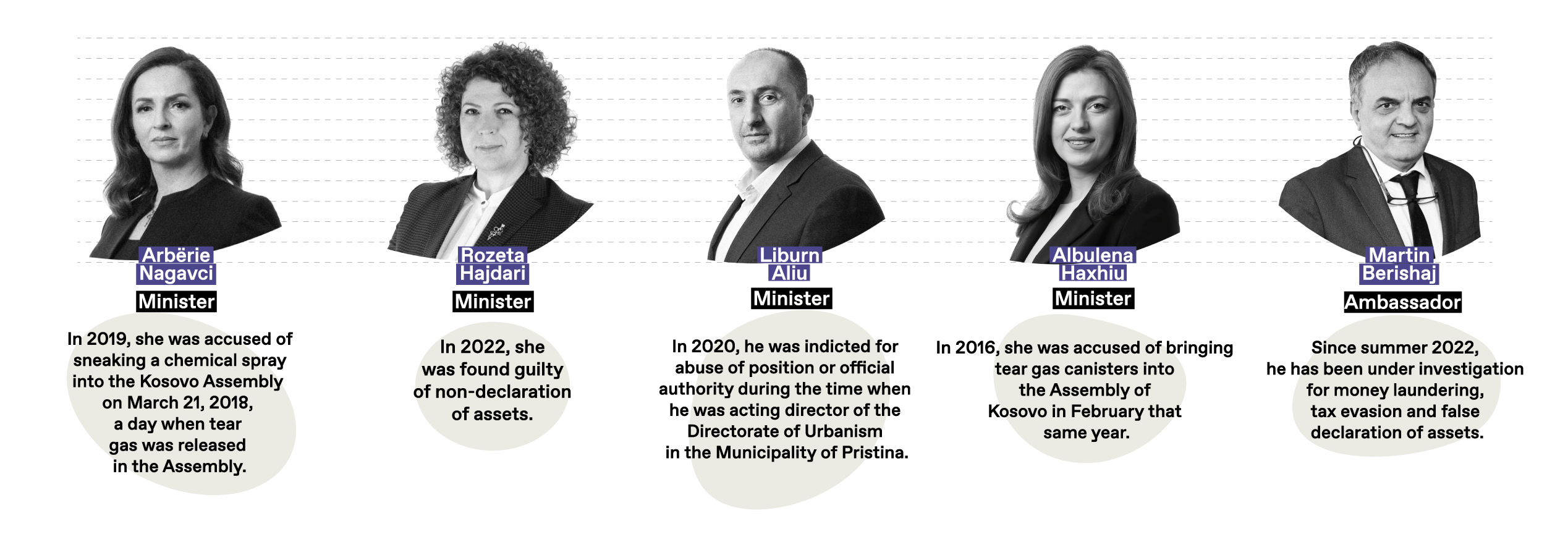
Kosovo’s ambassador to Croatia, Martin Berishaj, appointed during the Kurti government, is suspected of being involved in money laundering. In April 2022, the Slovenian media wrote that the private Slovenian energy company GEN laundered money by sending it through its subsidiaries in other Balkan countries. According to the report, its subsidiary in Serbia paid Berishaj at least 600,000 euros for consulting between 2019 and 2022. Media outlets reported that this money was sent to Berishaj’s company “MB Consulting” before Berishaj withdrew it and sent it to Slovenia to the then-opposition politician, now the Slovenian Prime Minister, Robert Golob.
Berishaj is under investigation in Kosovo for money laundering, tax evasion and false declarations of wealth. He continues to be the ambassador of Kosovo in Croatia.
Poverty levels increase
Inflation hit record levels throughout 2022 and early 2023 and reduced the value of Kosovars’ paychecks and savings. According to the UNDP Public Pulse poll, the three main concerns of the respondents were: unemployment, poverty and the price increases for essential products.
The Kurti government took two main actions about inflation: support packages and the Law on Wages.
Although any money that flows in the market is good for the economy, aid through one-time payments have been criticized by some economists, who argue that these interventions are neither comprehensive nor sustainable.
The Private Sector Union and Chamber of Commerce criticized the government for favoring the public sector while leaving the private sector, which is the main employer, without sufficient support. According to them, neither the initiatives to support salary increases in the private sector, nor the three-month salary support for new employees were sufficient because the subsidized amount was small and the subsidy was short-lasting.
One problem that arose with the support packages was a lack of clarity in who was most in need of support. In Kosovo, the last poverty report by the Kosovo Agency of Statistics was made in 2017 and does not cover changes that have happened since.
The existing social schemes are exclusionary for many families in need. In addition to unemployment criteria, the applicants for these schemes must meet other criteria, such as all family members being dependent or unable towork.
According to the World Bank report on Kosovo for 2022, about 7% of the total population benefits from the social assistance scheme, but the official poverty rate is about 20%. Only one in four people in the lowest quantile — the stratum with the lowest incomes — receive social assistance.
On August 25, 2022, inflation and the non-fulfillment of the demand for an additional 100 euros until the adoption of the new Law on Wages, led the Union of Independent Trade Unions of Kosovo — which brings together almost all trade unions in Kosovo — to a general strike.
POVERTY ALLEVIATION
March 2022
100 euro payments for public and private sector workers, students and pensioners; double payment for beneficiaries of the social scheme
October 2022
100 additional euros for pensioners;
double payment for social assistance beneficiaries;
50 additional euros for public officials until the end of the year;
100 additional euros for workers in public enterprises;
100 euros for students, paid out once in November.
Government support for families
Launched in July 2022, this package targeted those who are registered as unemployed and have no other employed family members. The government paid 70% of their gross salary (up to 300 euros) for six months.
Superpuna
This platform aims to find employment for young people aged 18 to 25 who have not worked before. The government would support the salary of new employees with 264 euros, equivalent to minimum wage, for up to six months.
The Law on Wages, in which new wage coefficients and wage scales were published, became the focus of public discussion at the beginning of 2023. The Law on Wages in the public sector of Kosovo entered into force on February 5. The government presented it as creating equality between different categories of workers and providing the largest wage increase since 2008.
The law also reduced some workers’ wages while others received symbolic increases. The law also reduced some previously existing allowances for some workers, which had been added to the net wage.
For example, in infographics shared on Kurti’s Facebook page, the government claimed that the basic salary for police would increase from 392 euros to 619 euros. But before this law police officers often received more than 619 euros after taking into account work experience, hazard pay, overtime and night shift work.
Now, many of these bonus allowances have been removed. With the new law, the hazard pay for police officers cannot exceed 1% of the overall budget of the Kosovo Police, which the Police Union has called insufficient.
According to the Police Union, the actual salary increase, after removing the allowances, does not exceed 50 or 60 euros.
Criticism of the government’s changes in this Law has been mainly related to the elimination or limitation of such allowances. For many categories of workers, this change will negatively affect the total amount they will receive at the end of the month. So far, the Ombudsman has received over 50 complaints against this law.
Only strikes bring attention to education
The few times the government mentioned education was when teachers went on strike.
From August 25, 2022, a few days before the start of the new school year, under the umbrella of the United Union of Education, Science and Culture (SBAShK), the teachers of Kosovo went on strike for more than a month.
They demanded financial support of 100 euros for all education workers to cope with inflation until the Law on Wages would be approved. They also asked to be included in the drafting of this law. The government initiated the support package which provided for the allocation of 50 euros per month for all public officials until the end of the year. But the strikers considered this package insufficient.
For a month, the government confronted SBAShK and threatened them with a penalty through the suspension of salaries for the month they were on strike. Prime Minister Kurti, among other things, called the strike “blackmail,” “a threat” and the “ruin of the state,” mentioning also the poor results of the students in PISA, even though this responsibility falls more under the Ministry of Education than the teachers or the union. The government’s language was criticized as an “infringement of trade union freedom in Kosovo.”
Meanwhile, one of the goals of the Kurti government was the construction of 160 kindergartens that would increase the scope of early education from 7% of children to 24%. But so far, only four kindergartens have been completed — one in the village of Vrelle in Istog, one in Zhegër in Gjilan, one in Qifllak in Vitia and one in Prizren. In the 2023 budget, 6.5 million has been set aside for the construction of new kindergartens. This includes about 21 kindergartens, the construction of which will happen between 2022 and 2026.
Only 4 out of 160 kindergartens promised were built
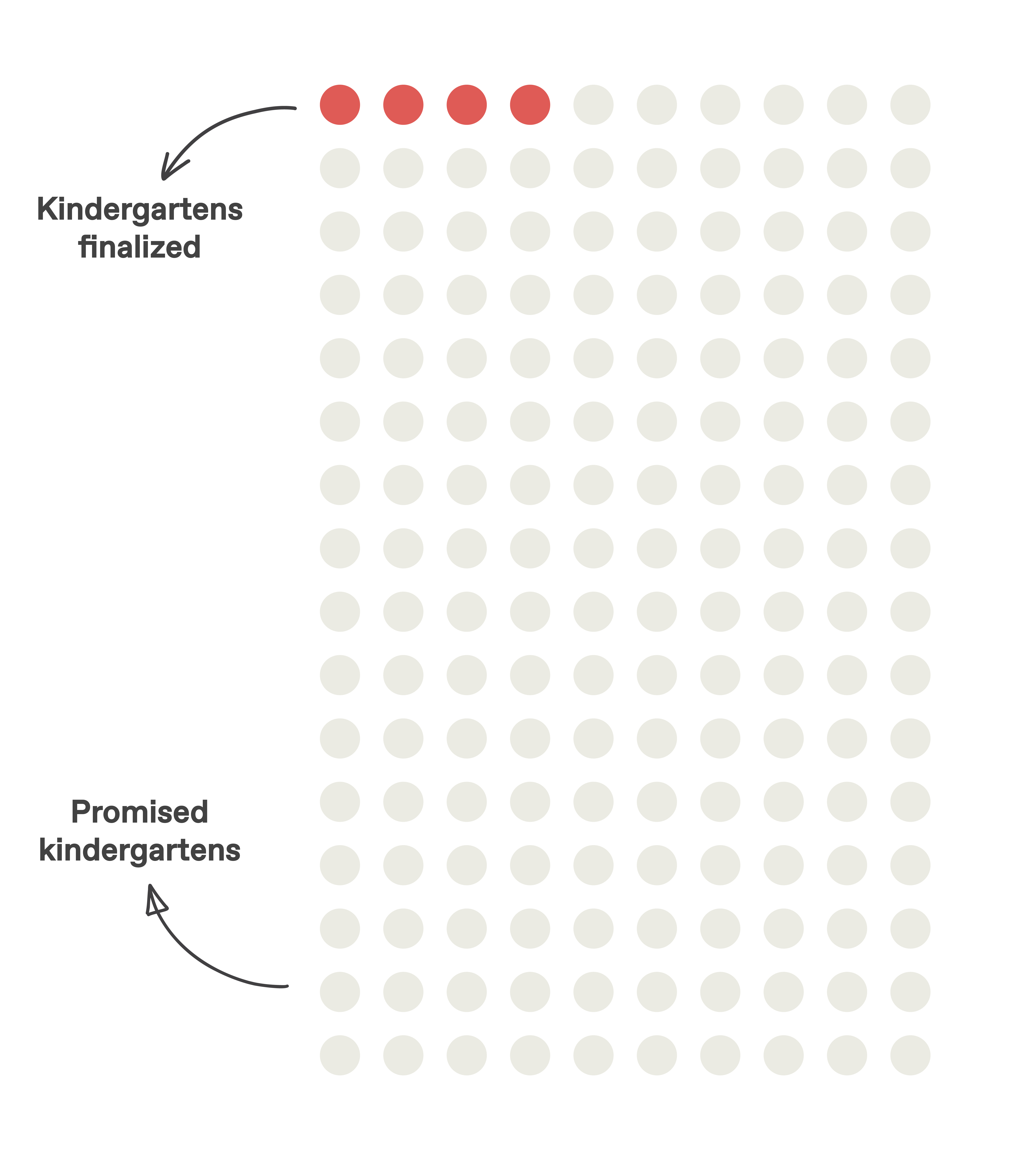
A K2.0 investigation in May 2022 found that Roma and Ashkali children are being segregated from their peers in the Serbian parallel education and that the Kosovo government has failed to address the needs of these vulnerable children. Activists called this an indicator of the general discrimination that the Roma and Ashkali communities experience on a daily basis.
Minister of Education Arbërie Nagavci told K2.0 that “the issue of Serbian schools is a very complex political issue since they are schools that are not controlled by the institutions of Kosovo.” They commented that until the time of our research they had no evidence that there is segregation in schools, even though NGOs and activists have raised this issue with the institutions for years.
The health sector at a standstill
Although the health sector is high on the priorities of the VV’s governing program, the situation in this sector remains severe. The program states that “our priority for health, in addition to the management of the Covid-19 pandemic, is the implementation of comprehensive reform that enables the development of the health system.” Yet no draft law aimed at reforming the health sector has been approved in 2022.
The Ministry of Health found itself in difficulties due to changes of ministers.
Appointed in November 2021 as minister of health, Rifat Latifi resigned in October 2022. There was no health minister for almost two months until the government reappointed Minister Arben Vitia, who in October 2021 had resigned from this post to join the race for mayor of Prishtina.
In less than two years of governance, the appointed minister of health has changed five times.
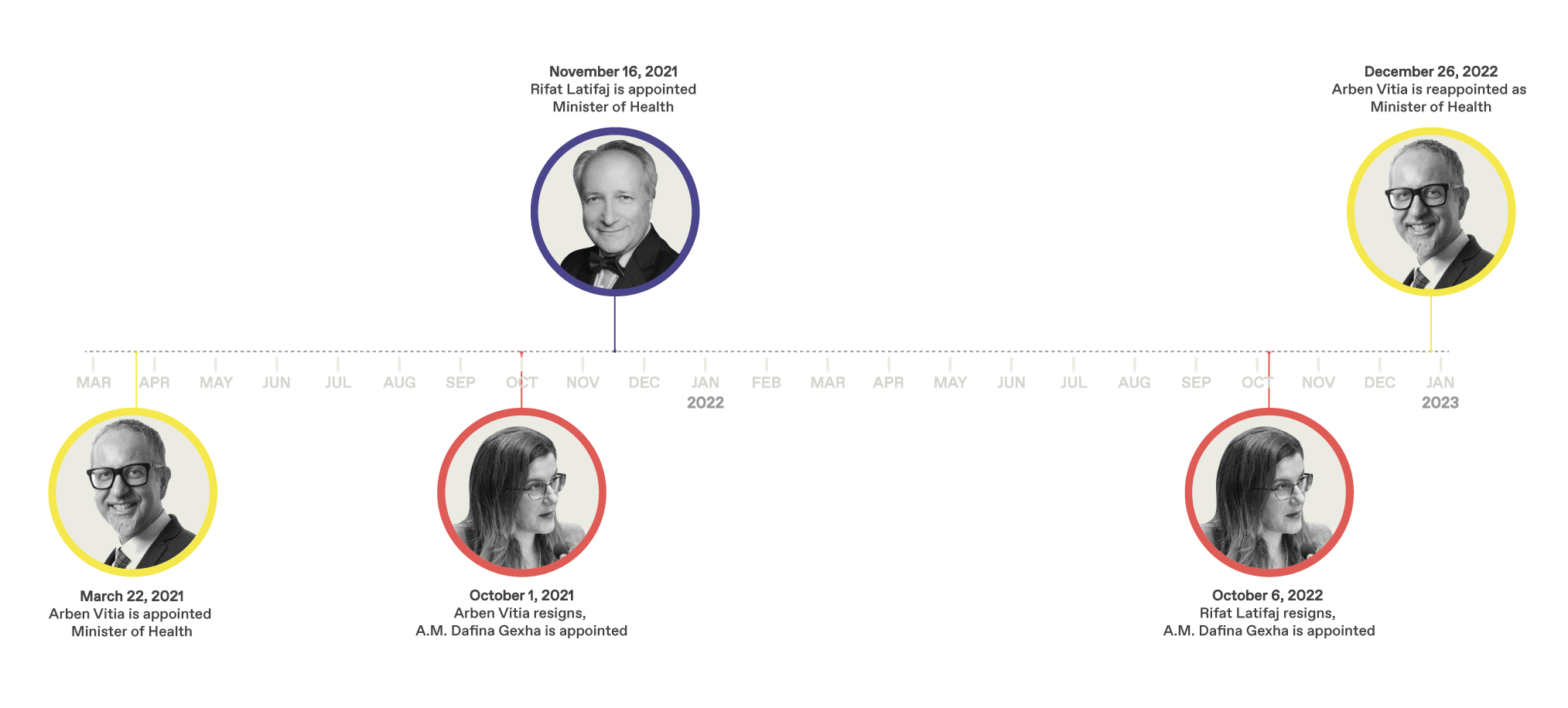
In September 2022, the Kurti government established the Health Executive Commission, which he would lead. According to Kurti, healthcare is in a serious situation and it was not enough that only Minister of Health Latifi was committed to the issue. However, it is not clear what is being done by this commission.
The media continuously reported on the lack of essential medicine for cancer patients, beds for operations, infusions, gloves and urine bags in the clinics of the Kosovo University Hospital and Clinic Service (ShSKUK). Koha reported that around 1,300,000 euros meant to be spent on medicine and other medical supplies in 2022, had gone into surplus as the management failed to complete the procurement process. In addition, for at least four months, ShSKUK has not been able to procure liquid soap or toilet paper.
Human rights, but not for all
VV’s promise to prioritize “all citizens,” as promoted in their well-known slogan “Krejt dhe Drejt” (All and fair), seems to have not included everyone.
In March 2022, the new government was tested in terms of respecting the rights of LGBTQ+ citizens in Kosovo. It did not pass this test. On March 16, the draft law of the Civil Code, a document that would regulate various aspects of private and public life in Kosovo, was put to the vote.
Among the 1,630 articles of the draft law, article 1,138, paragraph 2 opened the way for registered same-sex civil unions. The law, which the government presented, did not pass. Among the loudest adversaries were VV Assembly members Burim Meta, Gramoz Agusholli and Labinotë Demi Murtezi.
The 2022 U.S. State Department report on human rights in Kosovo stated that the Ombudsperson Institution in Kosovo has emphasized that Assembly members, representatives of political parties and government officials used derogatory language against LGBTQ+ people when the Civil Code was discussed.
The hate speech and misinformation, which were spread and incited in the Assembly, brought activists to the streets, protesting under the slogan “Homophobe, you have no place in the Assembly.” Likewise, the most prominent organizations for the protection of human rights, such as the Association for Equal Rights for the Western Balkans and Turkey and Human Rights Watch, sent letters calling on the deputies and other stakeholders to act according to the Constitution of Kosovo, which does not mention gender or sex in relation to marriage, and asked not to discriminate same-sex couples.
After the rejection of the law, it is not clear when the Civil Code will return to the Assembly for voting or what it will contain in relation to the recognition of civil unions or the right to same-sex marriage.
On March 8, just like in 2022 and 2023, the squares of Prishtina and other municipalities were filled with protesters. They carried slogans such as “justice for the murdered women,” “how many more missed calls” and “the state has the blood of murdered women on its hands.” Yet violence against women, femicide and cases of institutional neglect continued.
On August 29, 2022, the news broke of an 11-year-old girl who was raped for seven hours in a public park in Prishtina, by five men and boys. This incident turned people’s attention to institutional negligence when it comes to the protection of women and girls.
Feminist groups and organizations called a protest. On August 31, thousands of people came onto the streets — one of the biggest protests against gender based violence in recent years — demanding concrete actions from the government and other institutions. The government announced the dismissal of the Director of the Regional Police in Prishtina and the Director of Operatives in the Regional Directorate of Prishtina. The General Director and the Director of the Directorate for the Treatment of Prisoners and Minors offered their resignations.
Activists, believing their demands had not been met, continued protesting on September 5. New details reported by the media revealed that the same minor had been raped by six other men a month earlier. Until this case became public in August, no one had been arrested for it. After the protests, seven activists were fined for disrupting public order in the two protests, on August 31 and September 5, an act that was described as the “persecution of activists.”
In October 2022, the government approved a draft law for changes to the Criminal Code to “encourage judges and prosecutors to react and act more and faster” when it comes to violence against women. According to the changes, the Judicial Council will have a register with the information of individuals who are found guilty of such criminal offenses and this register will be public. Those found guilty will be banned from holding public positions for three to 10 years and will be deprived of the right to obtain a driver’s license and the right to drive a car for one to five years.
At the end of 2022 another case drew attention. Hamide Magashi was killed by her husband in the courtyard of the hospital, where she had gone to give birth. According to the media, Magashi had a protection order against her husband and suspicions arose that police officials had filled out forms to monitor the protection order after she was killed.
Kurti chose to comment on the case in a way that was widely criticized and contrary to the principles of human rights. In a Facebook post Kurti said “Our enemies will be thinking, there are two less Albanians,” referring to Magashi and her unborn baby.
In its second year, the Kurti government seems to have stalled when it comes to delivering the goals it had set in the election campaign and when it took power. The Kosovo-Serbia dialogue, which was not a priority initially, inevitably became one. The economic growth that was promised, stagnated. The education and health sectors continued to be weak points and the institutional passivity against the violation of human rights, especially women’s, continued.
In the meantime, the Kurti government still has two years left to prove whether it will get to work and realize its promised goals.
Additional reporting by Aulonë Kadriu
Feature image: Atdhe Mulla / K2.0.
